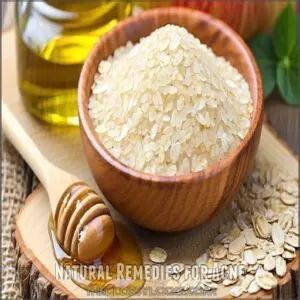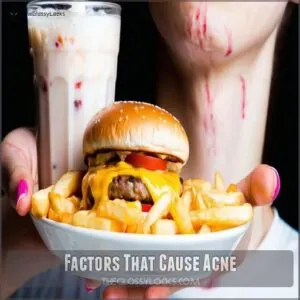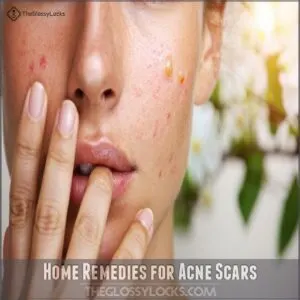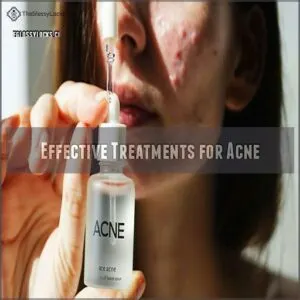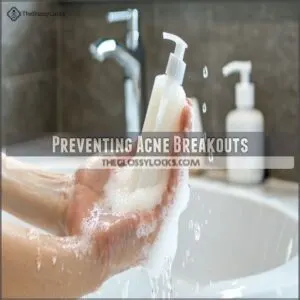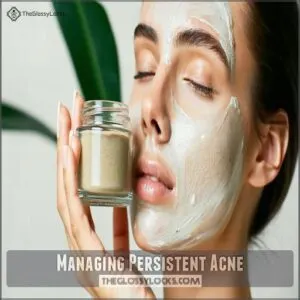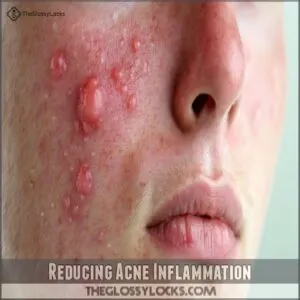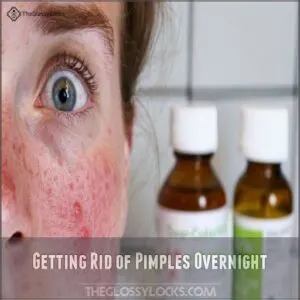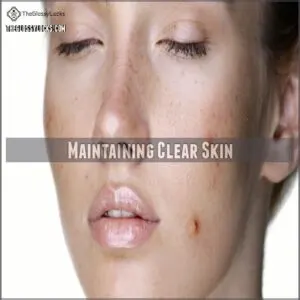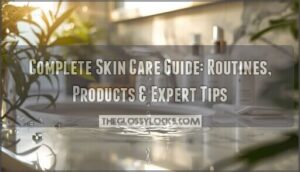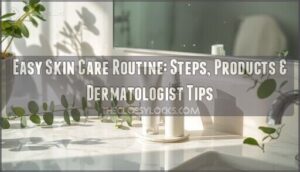This site is supported by our readers. We may earn a commission, at no cost to you, if you purchase through links.
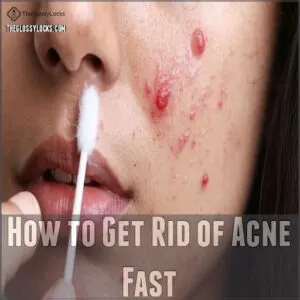 Struggling to figure out how to get rid of acne fast?
Struggling to figure out how to get rid of acne fast?
Start with benzoyl peroxide, a trusty ally in the battle against blemishes, often available in creams or gels.
Salicylic acid is another go-to, unclogging those stubborn pores and reducing inflammation.
Tea tree oil offers a natural touch, with its antimicrobial properties helping to clear pesky pimples.
Don’t forget the power of a little ice to calm redness, like using a magic wand on your skin.
If all else fails, a visit to the dermatologist for a cortisone shot can zap even the nastiest zit.
Curious for more? Keep reading!
Table Of Contents
- Key Takeaways
- Natural Remedies for Acne
- How to Get Rid of Acne Fast
- Factors That Cause Acne
- Home Remedies for Acne Scars
- Effective Treatments for Acne
- Preventing Acne Breakouts
- Managing Persistent Acne
- Reducing Acne Inflammation
- Getting Rid of Pimples Overnight
- Maintaining Clear Skin
- Frequently Asked Questions (FAQs)
- How to get rid of acne fast?
- I have severe acne. What can I do?
- How do I get rid of acne naturally?
- How long does it take to get rid of acne?
- How do I get rid of a stubborn acne spot?
- Can a dermatologist get rid of acne fast?
- How can I manage my persistent acne?
- What stops acne?
- Can I apply aloe only on my acne?
- What if my acne is really bad?
- Can you apply the honey and baking soda only on the pimple?
- Can you use more than one of these treatments on the infected area?
- How can I clear my acne fast?
- How to get rid of breakouts overnight?
- How can I reduce acne in 1 hour?
- How do you treat acne in 5 minutes?
- How does diet impact acne severity?
- Can stress worsen acne symptoms?
- Are acne treatments safe during pregnancy?
- Does hydration affect acne breakouts?
- How important is sleep for acne prevention?
- Conclusion
Key Takeaways
- Start with benzoyl peroxide and salicylic acid for effective over-the-counter treatments to fight acne quickly.
- Incorporating tea tree oil into your skincare routine, specifically for its potential to reduce inflammation and prevent new acne scars through its main component terpinen-4-ol antibacterial properties, can be particularly beneficial. Incorporate natural remedies like tea tree oil and apple cider vinegar for their antimicrobial and anti-inflammatory properties.
- Manage lifestyle factors by maintaining a balanced diet, staying hydrated, and reducing stress to prevent breakouts.
- Consult a dermatologist for personalized treatments if over-the-counter solutions and natural remedies don’t work.
Natural Remedies for Acne
If you’re tired of spending money on expensive acne treatments that don’t work, you’ll be happy to know that your kitchen cabinet might hold the answer to clearer skin.
From apple cider vinegar to green tea, these science-backed natural remedies can help fight acne-causing bacteria and reduce inflammation without harsh chemicals.
Apple Cider Vinegar
Looking for a natural way to zap those zits? Apple cider vinegar has antibacterial properties that can help combat acne-causing bacteria, reducing blackheads naturally. Apple cider vinegar might be your new secret weapon against acne. Research suggests it packs some serious bacteria-fighting power, thanks to its unique fermentation process.
Here’s what makes it effective:
- Contains citric acid that targets P. acnes bacteria
- Lactic acid helps fade acne scars
- Natural antimicrobial properties fight fungi and bacteria
Just remember: dilute it first, as straight ACV can irritate your skin.
Aloe Vera
Inside aloe vera’s clear gel lies a powerful combination of salicylic acid and sulfur—two proven acne-fighting ingredients.
Scientific research suggests that when combined with other natural substances, this tropical plant’s extract can greatly improve your skin’s appearance.
While pure aloe vera gel from stores can help (check for no added ingredients), you’ll get the best results using it alongside your existing acne treatment routine.
Green Tea
Beyond being your morning pick-me-up, green tea packs powerful antioxidants that can help fight acne.
Research shows its polyphenols target inflammation and bacteria, making it a standout natural remedy.
- Drink 2-3 cups daily to reduce breakouts from the inside out
- Apply cooled green tea bags directly to problem areas for 5-10 minutes
- Mix green tea extract with your moisturizer for added benefits
- Use green tea-based skincare products for consistent results
Honey and Cinnamon
With powerful antibacterial properties, honey and cinnamon create a dynamic duo against acne-causing bacteria.
Research shows that honey alone can block P. acnes growth, while cinnamon bark extract enhances these antimicrobial effects.
You’ll find these ingredients most effective when combined into a gentle face mask.
While more research is needed, many users report reduced inflammation and clearer skin after regular use.
Tea Tree Oil
Tea tree oil stands out as nature’s powerhouse against acne.
Research shows it’s just as effective as benzoyl peroxide, but gentler on your skin.
You’ll want to dilute this potent oil before use – mix 1-2 drops with 12 drops of carrier oil like jojoba or coconut.
Remember, the FDA doesn’t regulate essential oils, so choose a reputable brand and always do a patch test first.
How to Get Rid of Acne Fast

Looking for fast acne relief? You’re not alone – millions seek quick solutions for those unwanted breakouts. While there’s no overnight cure, you can speed up healing with proven methods that dermatologists recommend.
Start by keeping your hands off your face and using a gentle, non-comedogenic cleanser twice daily. For severe cases, consider consulting a dermatologist about dermatologist-recommended treatments.
For rapid results, try these science-backed approaches:
- Apply ice wrapped in a clean cloth for 1-2 minutes to reduce redness and inflammation
- Spot treat with benzoyl peroxide before bed, using a white pillowcase to prevent bleaching
- Dab on a thin layer of honey as a natural antibacterial treatment
Remember, rushing treatment can sometimes make acne worse. If you’re dealing with severe breakouts, schedule a dermatologist visit – they can prescribe medications that work faster than over-the-counter solutions.
Factors That Cause Acne
Your daily habits and lifestyle choices play a bigger role in causing acne than you might think, from what you eat to how much stress you’re under.
While genetics can influence your skin’s behavior, you’ll notice that factors like your diet, exercise routine, and even your milk consumption can trigger those unwanted breakouts.
Diet and Glycemic Index
Your daily food choices play a key role in managing acne, particularly in regards to their glycemic index (GI).
Research suggests that high-GI foods can trigger increased sebum production, potentially leading to breakouts.
By switching to low-GI alternatives like whole grains, legumes, and most fruits, you’re not just making better food choices—you’re giving your skin a fighting chance.
Think of it as feeding your face from the inside out.
Stress and Anxiety
During stressful times, your body produces more cortisol, a hormone that can trigger excess oil production and inflammation – leading to those unwanted breakouts, which is why incorporating stress-reducing techniques like natural remedies for hormonal acne into your routine can help manage stress levels.
You’re not imagining it: research shows that stress really does make acne worse by disrupting your skin’s natural balance.
The good news? Simple techniques like meditation, deep breathing, and getting quality sleep can help manage stress levels and reduce acne flare-ups.
Exercise and Physical Activity
Exercise does more than build muscle – it’s your skin’s secret weapon against acne. Breaking a sweat helps regulate hormones and decrease stress, two major acne triggers.
Here’s how working out fights breakouts:
- Increases blood flow to deliver nutrients to skin cells
- Reduces cortisol levels that cause excess oil
- Flushes out toxins through sweating
- Balances hormone levels naturally
- Boosts endorphins for better stress management
Remember to wash your face after exercising to remove sweat and bacteria.
Milk Consumption
While managing an active lifestyle helps control breakouts, what you drink matters too.
Research suggests whole milk might trigger moderate to severe acne in some people.
The hormones in dairy products can increase sebum production and inflammation, though everyone’s skin reacts differently.
If you notice flare-ups after your morning latte, try switching to plant-based alternatives like almond or oat milk.
Home Remedies for Acne Scars
You’ll be glad to know that, with the right approach to skincare, like using tea tree oil as a natural astringent to unclog pores how to get rid of whiteheads naturally at home, you can help prevent acne breakouts. Those stubborn acne scars don’t have to stick around forever, thanks to several proven home remedies that work with your skin’s natural healing process.
Home remedies can help fade those marks while keeping your skin healthy and hydrated.
Whether you’re dealing with dark spots or uneven texture, natural ingredients like apple cider vinegar, gentle exfoliants, and aloe vera can help fade those marks while keeping your skin healthy and hydrated.
Lactic Acid in Apple Cider Vinegar
Apple cider vinegar’s lactic acid works wonders on those stubborn acne scars you’ve been battling.
Here’s what makes this kitchen staple a powerful ally in your skincare routine:
- Naturally exfoliates dead skin cells without harsh chemicals
- Promotes collagen production to fill in indented scars
- Balances your skin’s pH levels for best healing
- Helps fade post-inflammatory hyperpigmentation
You can find products specifically designed to tackle apple cider vinegar scars to incorporate into your skincare routine.
Just remember to dilute it properly – one part vinegar to three parts water.
Your skin will thank you later.
Exfoliation for Skin Cell Removal
Dead skin cells can be like stubborn houseguests – they overstay their welcome and clog your pores.
Regular exfoliation helps remove this buildup, allowing your acne treatments to penetrate deeper into the skin.
For sensitive skin, try opting for gentle chemical exfoliants like alpha-hydroxy acids or beta-hydroxy acids.
You can create an effective DIY scrub using sugar or salt, but be gentle – over-exfoliating can irritate acne-prone skin.
Start with once-weekly sessions and adjust based on your skin’s response.
Aloe Vera for Skin Hydration
From the depths of nature’s medicine cabinet, aloe vera emerges as a powerful ally in your fight against acne scars.
This tropical plant’s clear gel contains salicylic acid and sulfur, proven ingredients in acne treatment.
When combined with your existing skincare routine, pure aloe vera gel can improve skin hydration and reduce scarring.
Just remember to patch test first and use only pure aloe without added ingredients.
Effective Treatments for Acne
You’ll find relief from stubborn acne with proven treatments that combine the power of prescription medications and professional procedures.
Whether you’re dealing with hormonal breakouts or deep-set blemishes, your dermatologist can create a personalized plan using topical creams, oral antibiotics, or even chemical peels to help clear your skin.
Topical Creams and Oral Antibiotics
When over-the-counter treatments aren’t cutting it, prescription options like topical creams and oral antibiotics might be your next step.
These medical-grade solutions pack a stronger punch against stubborn acne, though they’re not without considerations:
- Some antibiotics can trigger gut health issues
- Topical creams might cause initial skin irritation
- Regular use could lead to antibiotic resistance
- Results typically take 6-12 weeks to show
Talk with your dermatologist about starting with topical treatments before considering oral antibiotics.
Hormone Therapy for Hormonal Acne
Dealing with stubborn hormonal acne? Hormone therapy might be your secret weapon.
This targeted treatment works by regulating the hormones that trigger those frustrating breakouts, especially around your jawline and chin.
If over-the-counter treatments aren’t cutting it, talk to your dermatologist about options like birth control pills or anti-androgen medications.
They’ll help balance your hormones and clear your skin naturally.
Chemical Peels for Skin Resurfacing
Chemical peels offer a powerful way to resurface your skin and tackle stubborn acne. During treatment, a dermatologist applies specialized acids that remove damaged outer layers, revealing fresher skin underneath. Glycolic acid peels, for example, are a popular option, and learning how to use glycolic acid peel can help you achieve the best results. Here’s what you need to know about chemical peels:
- Light peels cost $150-300 and require minimal downtime
- Medium peels penetrate deeper but need 5-7 days recovery
- Deep peels show dramatic results but involve 2-3 weeks healing
- All types can improve acne scars and prevent future breakouts
Preventing Acne Breakouts
While you can’t completely prevent acne breakouts, you’ll greatly reduce their frequency by following a consistent skincare routine and avoiding common triggers like excess oil and bacteria.
Avoid touching your face throughout the day, as your hands can transfer acne-causing bacteria and oils directly to your skin.
Proper Skincare Routine
A consistent skincare routine acts as your shield against stubborn acne.
Start with gentle cleansing twice daily to remove excess oil and bacteria, and consider investing in an effective acne cleanser product.
Follow up with a non-comedogenic moisturizer to maintain your skin’s natural barrier.
Consider adding weekly exfoliation to prevent clogged pores, but don’t overdo it – too much can irritate your skin.
For best results, stick to your routine even when your skin looks clear.
Limiting Makeup and Sun Exposure
Heavy makeup can trap bacteria and oil right up against your skin, making breakouts worse.
While going makeup-free might feel scary at first, your skin will thank you for the breathing room.
When you do wear makeup, opt for non-comedogenic products and always remove everything before bed.
As for sun exposure, limit your time outdoors between 10 AM and 4 PM, and don’t skip the SPF.
Avoiding Popping Pimples
While limiting makeup gives your skin room to breathe, there’s another temptation you’ll need to resist – popping those pesky pimples.
Your fingers might be itching to squeeze, but here’s the truth: popping pimples can force bacteria deeper into your skin, leading to inflammation and permanent scarring.
Instead, keep your hands away and let your skin’s natural healing process do its work.
Managing Persistent Acne
If you’ve tried every face wash and cream but still can’t shake those stubborn breakouts, you’re not alone in your battle against persistent acne.
When over-the-counter treatments aren’t cutting it anymore, you’ll find lasting relief through professional solutions like prescription medications and dermatologist-guided therapies.
Consulting a Dermatologist
Five tell-tale signs indicate it’s time to see a dermatologist: persistent breakouts, deep painful cysts, acne in unusual places like your thighs, scarring concerns, or if over-the-counter treatments aren’t cutting it.
Think of dermatologists as skin detectives – they’ll analyze your specific acne type, identify triggers, and create a personalized treatment plan.
Don’t wait until your confidence takes a hit; early intervention can prevent long-term scarring.
Trying Prescription Medications
Once your dermatologist gives you the green light for prescription medications, you’ll have several proven options to tackle stubborn acne.
Before turning to prescription treatments, consider the impact of lifestyle factors, such as hormonal fluctuations and stress, on acne development.
Common treatments include:
- Tretinoin creams that boost cell turnover and clear pores
- Antibiotics like doxycycline to fight bacteria (typical dosage: 50-100mg daily)
- Isotretinoin for severe cases, with close monitoring
- Topical combinations like clindamycin/benzoyl peroxide for moderate breakouts
Remember to discuss potential side effects and costs with your doctor, as some medications need insurance approval.
Exploring Alternative Therapies
Beyond prescription medications, alternative therapies can offer relief for persistent acne.
Natural treatments like brewer’s yeast (Hansen CBS) have shown promising results, with studies reporting 80% improvement in participants over five months. You can find brewer’s yeast acne products online, such as brewers yeast acne.
You might also consider light therapy, which uses specific wavelengths to target bacteria, or acupuncture to help balance hormones.
Remember to discuss these options with your healthcare provider before starting any new treatment.
Reducing Acne Inflammation
You don’t have to live with red, angry pimples that make your face feel like it’s on fire.
Recent studies show that natural anti-inflammatory remedies, from cold compresses to omega-3 supplements, can effectively calm your irritated skin and speed up healing time.
Applying Cold Compress
When persistent acne leaves you feeling frustrated, it’s time to cool things down – literally.
A cold compress can be your skin’s best friend, reducing inflammation and calming angry breakouts.
Wrap ice cubes in a clean cloth and gently press against affected areas for 1-2 minutes.
You’ll notice reduced redness and swelling, plus some welcome pain relief.
Just don’t apply ice directly to your skin.
Using Anti-Inflammatory Products
Anti-inflammatory products pack a powerful punch against angry, red acne.
Natural options like green tea extract, witch hazel, and aloe vera help calm inflamed skin without harsh chemicals.
You’ll find these ingredients in many over-the-counter serums and creams.
For best results, look for products containing multiple anti-inflammatory compounds – they work together to reduce redness and swelling while promoting healing.
Trying Omega-3 Fatty Acids
Omega-3 fatty acids could be your skin’s secret weapon against stubborn acne.
Research shows that EPA and DHA, found in fatty fish like salmon and sardines, help reduce inflammation that triggers breakouts.
You’ll also find these beneficial fats in walnuts, chia seeds, and ground flax seeds.
If you’re not a fan of fish, consider taking a high-quality fish oil supplement to support your skin’s health.
Getting Rid of Pimples Overnight
You’ve probably noticed that pesky pimple right before an important event, but don’t worry – you can reduce its appearance overnight with the right approach.
While there’s no magic solution that will completely eliminate acne in just eight hours, you’ll find that combining proven over-the-counter treatments with proper skincare techniques can noticeably minimize redness and swelling by morning.
Using Over-the-Counter Alternatives
Looking for a quick fix for that stubborn pimple? Over-the-counter alternatives can be your best friends when you need fast results. Here are some proven options you’ll find at your local drugstore:
- Sulfur-based spot treatments that fight bacteria
- Salicylic acid pads for gentle exfoliation
- Clay masks to absorb excess oil
- Niacinamide serums to reduce inflammation
- Alpha hydroxy acid (AHA) products to unclog pores
Just remember to patch test first to avoid any skin reactions.
Trying Benzoyl Peroxide
Benzoyl peroxide is your acne-fighting superhero, working overtime while you sleep.
This powerful ingredient kills acne-causing bacteria and helps unclog pores, making it especially effective for cystic acne and stubborn blackheads.
Start with a lower concentration (2.5%) to minimize potential dryness and irritation.
If you’ve got oily skin, you can gradually work up to 10% strength for maximum effectiveness.
Applying Salicylic Acid
After trying benzoyl peroxide, salicylic acid offers another powerful weapon in your acne-fighting arsenal.
This beta-hydroxy acid (BHA) works differently by gently exfoliating inside your pores, making it ideal for overnight treatment.
Here’s what makes it special:
- Penetrates deep into pores to dissolve oil and dead skin
- Works well for sensitive skin types with less irritation
- Can be used alongside other treatments without over-drying
Maintaining Clear Skin
To keep your skin clear, you need to follow a consistent skincare routine and eat a balanced diet, which helps in reducing acne over time.
Establishing a consistent skincare routine, such as washing face twice daily, helps to maintain healthy skin. Staying hydrated and managing stress are also very important, as they contribute to maintaining healthy skin by preventing breakouts and inflammation.
Following a Consistent Skincare Routine
You’ve banished pimples overnight, now let’s make it last.
Follow a skincare routine like a trusty daily ritual—cleanse, tone, and moisturize.
Customize products that fit your skin type, because one-size doesn’t fit all.
Morning calls for SPF, while night demands rejuvenation.
Remember, frequency and consistency are key.
Think of it as brushing your teeth, but for your face!
Eating a Balanced Diet
Switching gears from skincare rituals, let’s ponder on your plate.
Acne-fighting foods aren’t just for the health nuts.
Embrace a diet for clear skin by dodging that sugar avalanche, which might trigger unwanted spots.
Similar to annoying relatives, food sensitivities can crash your skin party.
Make sure nutritional deficiencies don’t sneak in and sabotage your complexion glow-up.
Staying Hydrated and Managing Stress
Maintaining clear skin isn’t just about creams and potions.
Water is your skin’s best friend; think of it as nature’s moisturizer, flushing out toxins.
Stress can trigger pesky breakouts, so tackle it head-on with some exercise or a good night’s sleep.
Combine these with a balanced diet, focusing on the essentials, and your skin will thank you!
Frequently Asked Questions (FAQs)
How to get rid of acne fast?
Did you know 80% of people aged 11-30 experience acne? Sadly, there’s no magic bullet, but consistent skincare, a healthy diet, and managing stress can help clear your skin.
I have severe acne. What can I do?
Consider seeing a dermatologist for personalized treatments like topical creams or oral antibiotics.
Managing diet, stress, and skincare routine can also help.
Remember, patience is key, and taking small steps can lead to significant improvements.
How do I get rid of acne naturally?
Clearing up acne naturally involves understanding the causes of acne breakouts, such as excessive sebum production which clogs hair follicles effective home remedies. It then involves tapping into your inner powerhouse with remedies like diluted tea tree oil, applying soothing aloe vera.
Green tea’s anti-inflammatory properties, which can be harnessed by applying topical green tea treatments, can help soothe inflamed acne lesions. Enjoying antioxidant-rich green tea can also help in clearing up acne naturally.
Following a low glycemic diet to reduce hormone-induced breakouts is also an effective method to clear up acne naturally.
How long does it take to get rid of acne?
Getting rid of acne varies for everyone; mild cases might clear in a few weeks with treatments, while moderate to severe acne could take months.
Consistent care and patience, possibly with a dermatologist’s help, are key.
How do I get rid of a stubborn acne spot?
You’ve met your match with a stubborn acne spot.
Try dabbing diluted tea tree oil or a zinc cream directly on it.
Keep your hands off your face and see a dermatologist if it doesn’t budge soon.
Can a dermatologist get rid of acne fast?
Wondering if a dermatologist can zap away acne quickly?
While treatments like laser therapy or chemical peels might speed things up, there’s no overnight fix.
Effective plans, including prescription meds, often require patience and multiple visits for lasting results.
How can I manage my persistent acne?
Managing persistent acne involves moisturizing regularly, using non-comedogenic products, and avoiding stress, which can trigger breakouts.
Sometimes, diet adjustments help; consult a dermatologist if over-the-counter methods fail or if acne affects your self-esteem.
What stops acne?
Hark, friend! Several things curb acne: consistent cleansing, a balanced diet, stress management, and maybe even some ancient remedies like tea tree oil. But remember, a dermatologist’s advice reigns supreme.
Can I apply aloe only on my acne?
You can apply aloe vera directly to acne.
Its anti-inflammatory properties might help soothe your skin and reduce redness.
Just make sure it’s pure aloe gel, as additives might irritate your skin further.
What if my acne is really bad?
When your acne forms a dramatic sequel, it’s time to consult a dermatologist.
They can suggest prescription treatments or therapies like chemical peels and lasers, customized to your needs, helping reclaim confidence and clear skin.
Can you apply the honey and baking soda only on the pimple?
Sure, applying honey and baking soda directly on a pimple might help.
Honey’s antibacterial properties and baking soda’s exfoliating action can reduce inflammation.
Just be gentle to avoid irritation, and rinse thoroughly after application.
Can you use more than one of these treatments on the infected area?
Absolutely, you can combine treatments like tea tree oil and aloe vera for a more effective approach, just make sure to patch test them first to avoid irritation.
Always mix potent oils with a carrier for safety.
How can I clear my acne fast?
Combine gentle exfoliation with diluted tea tree oil for a quick acne fix.
Reduce sugar intake and hydrate well.
If it persists, consult a dermatologist for personalized treatments to regain clear skin and confidence.
How to get rid of breakouts overnight?
Overnight solutions rarely work, but applying diluted tea tree oil (known to reduce acne in 5% gel form) can help.
Don’t forget a light moisturizer afterward to avoid dryness.
Keep it realistic: fast fixes are often temporary!
How can I reduce acne in 1 hour?
You can’t erase acne in an hour, but a cool compress can soothe redness. Spot treatments might help, but lasting results need consistent care.
How do you treat acne in 5 minutes?
Quickly tackle acne by applying ice to reduce redness and swelling.
Cleanse your face gently to remove oil, then dab a little tea tree oil if you have some on hand, using a cotton swab.
How does diet impact acne severity?
Think of your skin as a mirror reflecting what you eat.
Acne can be exacerbated by consuming high glycemic index foods, like white bread and sugary snacks, which spike insulin levels.
A balanced diet may help manage acne.
Can stress worsen acne symptoms?
Stress can definitely make acne worse.
It ramps up oil production and inflammation, leading to more breakouts.
Managing stress through regular exercise, meditation, or simply taking a breather can help keep your skin clearer.
Are acne treatments safe during pregnancy?
When you’re pregnant, it’s essential to be cautious with acne treatments.
Avoid retinoids, salicylic acid, and certain antibiotics as they can be unsafe.
Always check with your doctor before using any acne medication during pregnancy.
Does hydration affect acne breakouts?
Picture hydration as your skin’s secret weapon.
Keeping your skin properly moisturized helps balance oil production, potentially reducing breakouts.
Dehydrated skin can overproduce oil, leading to clogging and acne.
So, drink up and maintain skin balance!
How important is sleep for acne prevention?
Getting enough sleep helps regulate hormones and reduces stress, which are common acne triggers.
Lack of sleep might lead to increased skin inflammation and fewer chances for skin to repair, potentially worsening breakouts and skin health.
Conclusion
Remember, 80% of people aged 11-30 experience acne. So, you’re not alone!
This journey to clear skin involves patience and consistency.
Finding what works best for you might take time, but don’t give up. Experiment with the natural remedies and over-the-counter treatments to find your winning combination for how to get rid of acne fast.
If problems persist, see a dermatologist. They can provide expert advice and solutions suited to your specific needs.
Clear skin is achievable; keep fighting the good fight!

